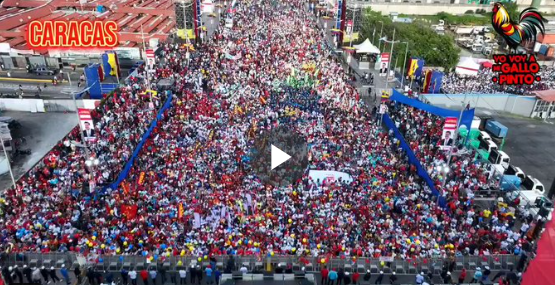The fake elections have western media playing their own games and trying to tell the world that the elections are real. Nothing could be further from the truth. Venezuela’s elections are far more corrupt than even the United States. Outright theft of votes is the norm, and fake electronic votes that are long before pre-determined are how it is all done. Much like in the U.S. in at least five states, which are Georgia, Michigan, Pennsylvania, Arizona and Wisconsin. Just like in the U.S., the regime in charge does whatever it wants and tells the people to go to hell. What are you going to do about it? That is the attitude given, which is why as things collapsed in Venezuela the people were disarmed quickly so they could not resist the coming repression. This is the same plan the Democrats have for the United States.
But for this news I will pretend that the election in Venezuela is real and point out the facts given by the regime in Venezuela.
Emirlendris Benítez’s tale is a haunting one. Vanishing into Venezuela’s shadows in August 2018, she and her partner—a mere taxi driver—were ensnared by authorities under dubious circumstances. Allegations spiraled, accusing her of a grand conspiracy to assassinate the president. The verdict? Thirty years behind bars, a sentence handed down without the semblance of a fair trial. But the nightmare deepened; she was pregnant when taken into custody. The guards, unyielding and brutal, assaulted her, leading to a tragic miscarriage. Reports from her family paint a grim picture of her time in prison—torture, including the brutal removal of her nails with a hammer, was her daily reality.
HUGE marches in Madrid in support of Maria Corina Machado’s election this weekend in Venezuela!
She is giving hope to Venezuelans all over the WORLD! 🇻🇪 pic.twitter.com/gpROBciMfE
— Joey Mannarino (@JoeyMannarinoUS) July 27, 2024
Foro Penal, a human rights watchdog, has chronicled an alarming number of politically motivated arrests in Venezuela—15,700 from 2014 to 2023. Hundreds remain imprisoned, a testament to the government’s unrelenting crackdown on dissent. Attempts by the BBC to solicit comments from the Venezuelan government and prosecutors were met with silence. Meanwhile, Nicolás Maduro, who ascended to power in 2013 following Hugo Chávez’s passing, is gearing up for re-election. The streets are lined with his images, and in a final campaign rally in Caracas, the regime pulled out all the stops, bussing in crowds and distributing food parcels as an enticement.
Maduro’s supporters, like Venus and Iván, are steadfast, extolling the benefits they’ve received from the PSUV party. Yet, even within his base, cracks are forming. Ana (a pseudonym), a relative of Benítez, confided anonymously about her family’s change of heart. They once stood with Maduro, but disillusionment has set in, as they’ve witnessed the machinery of justice—or rather, its absence—in Venezuela.
The 2018 election was marred by allegations of fraud, leading to widespread international rejection of Maduro’s presidency and an escalation of U.S. sanctions. Now, the opposition senses a shift, buoyed by favorable polls. However, the government, wielding control over the military and judiciary, is employing all means to quash dissent. This includes the detention of opposition figures, barring EU election observers, and disenfranchising Venezuelans abroad—a stark illustration of the regime’s desperation.
In Caracas, Venezuela, hundreds of thousands from all over gathered to give support for current President & candidate Nicolas Maduro, before the country’s Sunday election. The US though still claims there’s no democracy here… pic.twitter.com/OTSClS8Yfo
— Beyond Headlines (@Headline_Beyond) July 26, 2024
Take the case of Alcides Bracho, a teacher arrested in July 2022 after protesting for better wages. Accused of “terrorism,” Bracho endured dehumanizing conditions, including being held naked for 72 hours without food, water, or access to a toilet. His eventual release came only through a prisoner exchange with the U.S. Yet, his resolve remains unbroken; he continues to advocate for justice, despite the suffocating repression.
The opposition’s campaign efforts are stymied at every turn. María Corina Machado, a key opposition leader, has been barred from running in the upcoming election. Her associates have been detained, and even vendors providing services at her rallies have faced closure. With most TV and radio under state control, and digital outlets frequently blocked, the flow of information is tightly controlled. Volunteers with initiatives like Bus TV attempt to bridge the gap, sharing “real news” on public buses, underscoring the regime’s pervasive censorship.
Venezuela, despite its immense oil wealth, is mired in poverty. The economic mismanagement and alleged corruption have driven millions to flee, exacerbating a migration crisis that echoes at the U.S. border. People like Jhonatan Marcano, who struggles daily to provide for his family, capture the despair felt by many. Once a staunch supporter, Marcano now questions the party he once trusted, disillusioned by the lack of promised aid.
Venezuelan President Nicolas Maduro arrived at a closing rally, with estimates of millions of people in attendance. Meanwhile the US media has said these elections are not popular or democratic… pic.twitter.com/1VHyi3M4ly
— Beyond Headlines (@Headline_Beyond) July 27, 2024
Maduro attributes the nation’s suffering to U.S. sanctions, but critics point to deeper systemic failures. The West, eyeing Venezuela’s natural resources and geopolitical significance, particularly its alliances with Iran, China, and Russia, remains cautious. Any potential thaw in relations hinges on the forthcoming election’s credibility. Should the vote be deemed another farce, the status quo—sanctions and isolation—is likely to persist, leaving Venezuela in a precarious state of uncertainty.
Major Points:
- Emirlendris Benítez, imprisoned in Venezuela under dubious charges, suffered severe abuse and miscarriage.
- Foro Penal highlights over 15,000 politically motivated arrests, reflecting severe government repression.
- Nicolás Maduro faces growing discontent even among former supporters, amidst claims of electoral fraud.
- The opposition, despite momentum, is suppressed by government tactics, including media control and arrests.
- Venezuela’s economic crisis, marked by poverty and mass migration, underscores the country’s deep challenges.
Kirk Volo – Reprinted with permission of Whatfinger News



